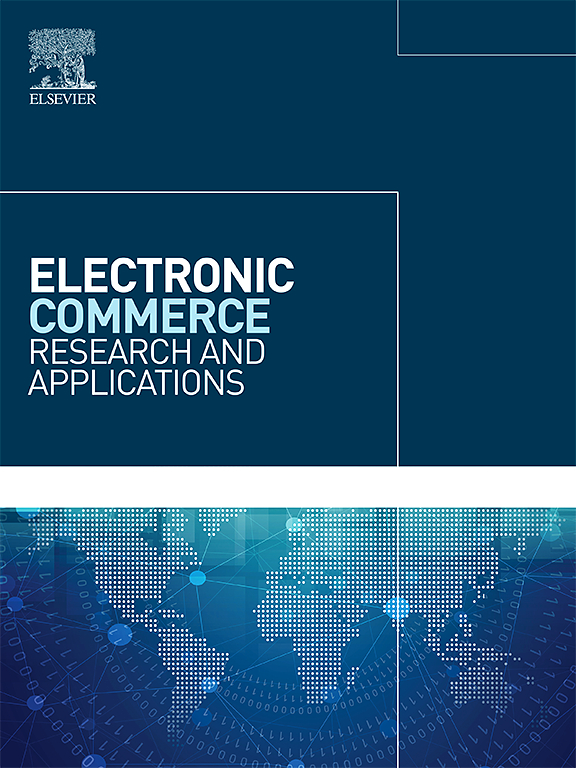基于消费者评级的在线食品配送市场的保险政策和定价决策
IF 5.9
3区 管理学
Q1 BUSINESS
Electronic Commerce Research and Applications
Pub Date : 2025-01-08
DOI:10.1016/j.elerap.2024.101474
引用次数: 0
摘要
最近移动技术的进步和聚合应用程序的兴起使许多消费者通过在线送餐平台购买产品,COVID-19的影响加速了这一趋势。消费者经常在购买前观察其他消费者的评分,以减少产品的味道和送货服务的不确定性。然而,评级的信息准确性可能会受到卖方的营销策略的影响,例如定价和交付保险政策。考虑到消费者的评级,首先,我们建立了两期模型来研究消费者的不确定性和不同的送货保险政策对卖家和消费者的影响。然后确定卖方的最优保险政策和定价决策。我们发现延迟交货的概率对产品的最优价格有非单调的影响。与我们的直觉相反,我们的分析表明,免费保险(FI)政策允许卖家通过影响消费者评级,从更大的延迟交货概率中获益。我们表明,FI并不总是对卖家和消费者有利;它可能同时降低销售者的利润和消费者的总剩余。令人惊讶的是,卖方总是可以收取更低的价格,但通过采用付费保险(PI)政策赚取更多的利润。此外,当卖方策略性地选择其价格和保险政策(例如,不保险,FI或PI)时,可以实现双赢;卖方应始终支持保险,即采用FI或提供PI,即使在所有情况下FI和PI都不占主导地位。本文章由计算机程序翻译,如有差异,请以英文原文为准。
Insurance policy and pricing decisions in online food delivery market with consumer ratings
Recent advances in mobile technology and the rise of aggregator apps have led many consumers to purchase products through online food delivery platforms, and the effects of COVID-19 have accelerated the trend. Consumers often observe other consumers’ ratings before purchasing to reduce the product’s taste and the delivery service uncertainties. However, the information accuracy of the ratings can be affected by the seller’s marketing strategies, such as the pricing and delivery insurance policy. Considering consumers’ ratings, firstly, we develop two-period models to examine how consumer uncertainty and different delivery insurance policies impact the seller and consumers. We then determine the seller’s optimal insurance policy and pricing decision. We find that the probability of delayed delivery has a nonmonotonic effect on the product’s optimal price. Counterintuitively, our analysis shows that a Free Insurance (FI) policy allows the seller to benefit from a greater delayed delivery probability by influencing consumer ratings. We show that FI is not always beneficial for the seller and consumers; it may reduce the seller’s profit and the total consumer surplus simultaneously. Surprisingly, the seller can always charge a lower price yet earn more profit by adopting a Paid Insurance (PI) policy. Furthermore, when the seller strategically chooses its price and insurance policy (e.g., No Insurance, FI, or PI), it can achieve a win-win situation; and the seller should always support insurance, i.e., adopt FI or offer PI, even though neither FI nor PI dominates under all conditions.
求助全文
通过发布文献求助,成功后即可免费获取论文全文。
去求助
来源期刊

Electronic Commerce Research and Applications
工程技术-计算机:跨学科应用
CiteScore
10.10
自引率
8.30%
发文量
97
审稿时长
63 days
期刊介绍:
Electronic Commerce Research and Applications aims to create and disseminate enduring knowledge for the fast-changing e-commerce environment. A major dilemma in e-commerce research is how to achieve a balance between the currency and the life span of knowledge.
Electronic Commerce Research and Applications will contribute to the establishment of a research community to create the knowledge, technology, theory, and applications for the development of electronic commerce. This is targeted at the intersection of technological potential and business aims.
 求助内容:
求助内容: 应助结果提醒方式:
应助结果提醒方式:


